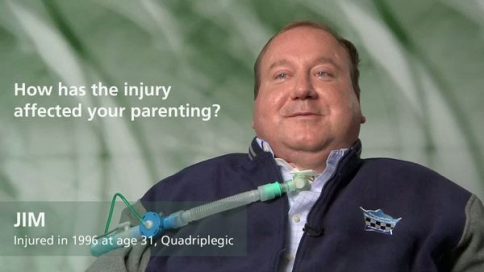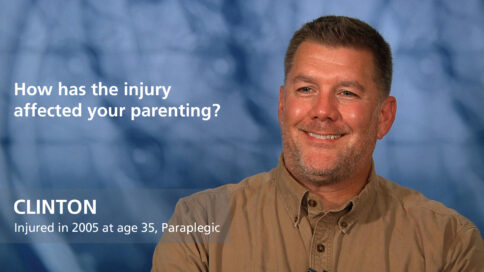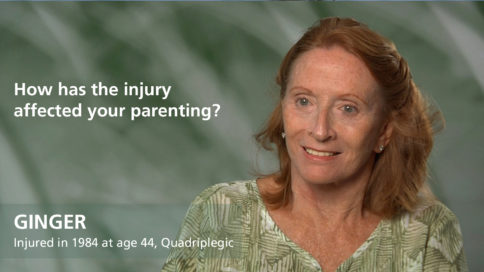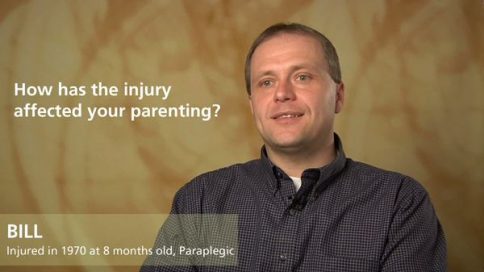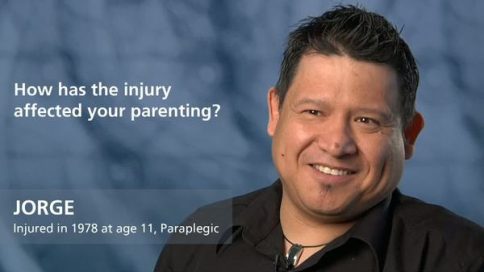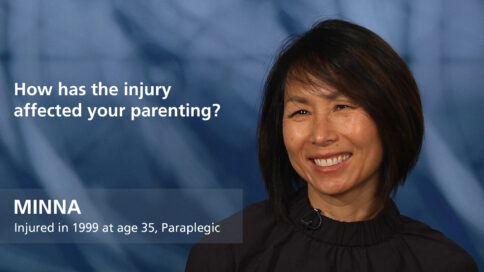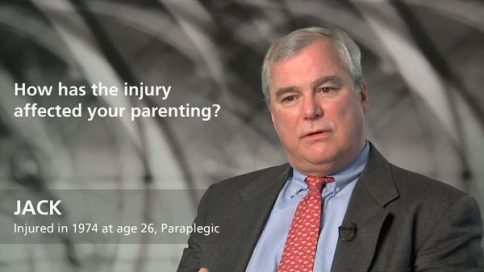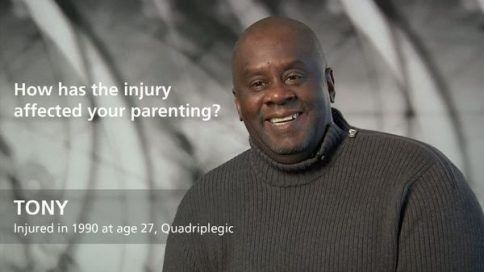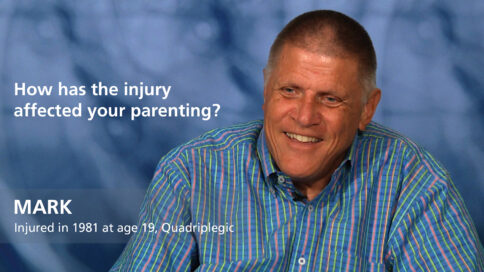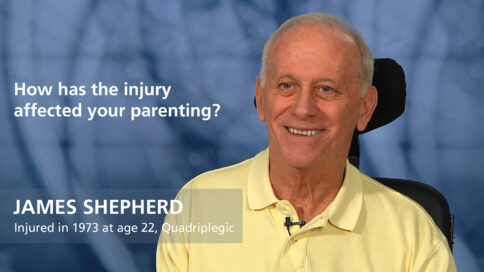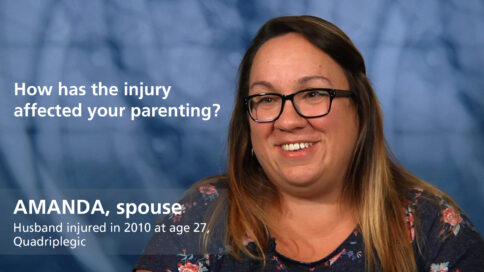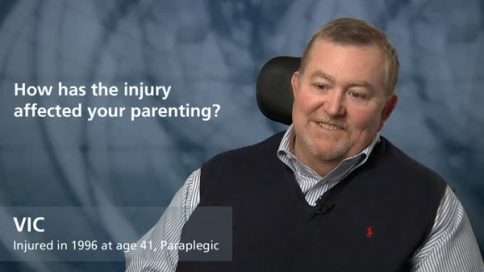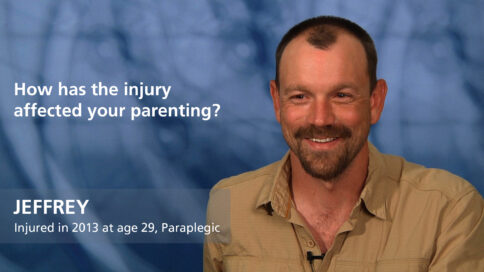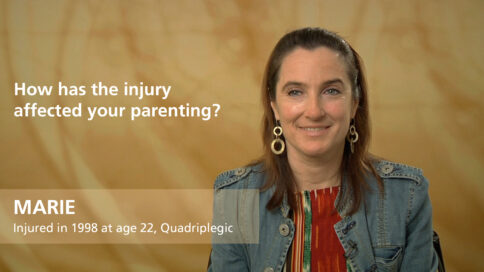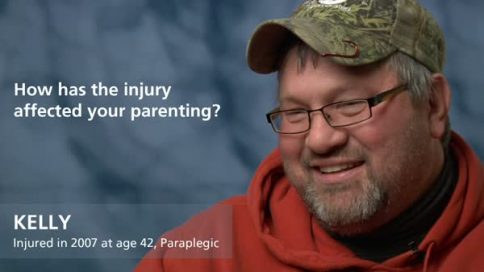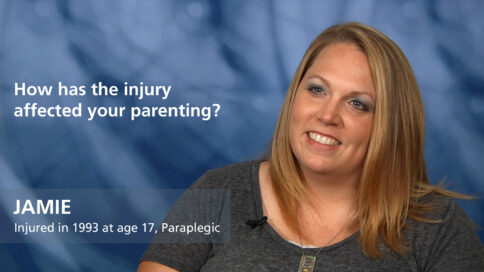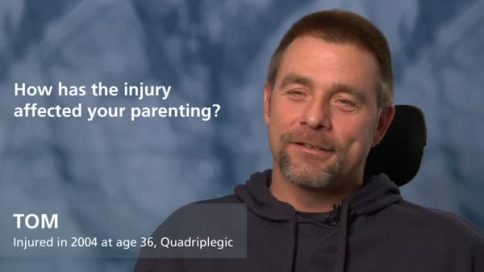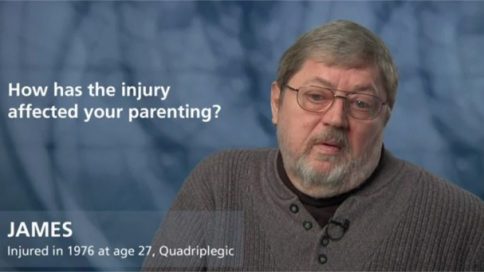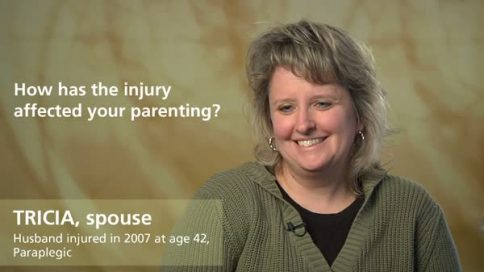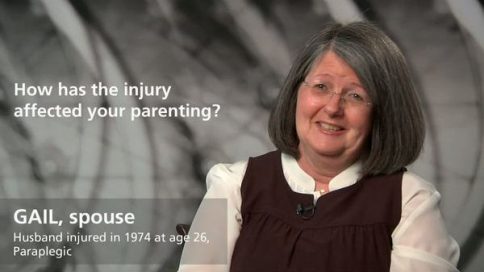|
Topics Choose a topic to watch videos that answer real-life questions |
Q&A: How has the injury affected your parenting?Problems with Parenting After a Spinal Cord Injury |
Filter byGENDERLEVEL OF INJURYAGE AT INJURYFAMILY MEMBERS |

Well with her being 14 right now, I get to see her five minutes a day is it. That's it, she wants absolutely nothing to do with me, but that's okay, she'll come around eventually. But she's a wonderful kid, and I think between her mother and myself, we've done a fabulous job raising her, considering the situation we're in. I mean I wanted to teach her to, you know, water ski, I wanted to teach her to snow ski. She's missed out on so many different things, but, you know, those are things I can't change, you know? I, I'd love to take her boating, I want to take her jet-skiing, I want to do so many things with her, but it's just not going to happen. So I have to let that go, and you know, just try to talk to her whenever I get a chance for her, whenever she gives me a chance to let me talk to her. She's grown up a lot faster because she's been surrounded by a lot of adult people all the time. So she's matured probably a lot faster than your average 14-year-old. And as far as me, you know I don't know, she used to say when I was younger, when she was younger, actually we were both younger, that the wheelchair was invisible and that really she doesn't know me any other way, so it's, it's just the way I am. I'm dad, and this is the way, this is the dad you get. Not being able to throw my small children up in the air as most parents would. Certainly, my children have not necessarily lacked from it, it’s more what I feel like I have missed out on. But at the same time, you know, taking a log carrier, and padding it so that I could roll my infants into it, and be able to pick them up off the floor without dropping them. But at the same time, I coach my son’s little league, I coach my girls’ lacrosse team now. So, as much as there’re certain things that I can’t do, there’s still a great deal that I’m able to do, and my children don’t know any different. I think to ask them would they prefer I was able to do everything, of course, again the natural reaction is “yes.” But if you would ask them if they really missed out on anything, I think the answer would be “no.” They had to grow up a little bit faster, because sometimes I needed their help, and still need their help. So, in many ways, it was very good for them. But, in other ways, I think it perhaps wasn't so good, because— especially my youngest daughter, had to step up to the plate, and couldn't always be a child—where as the other two had the time to be children. She's the one who had a difficult time initially because she was in that "me period"—between 13 and 14—where all a young teenager thinks about is herself. Perhaps the best thing that my disability has done in terms of how it's affected my parenting, is how it's affected my grandparenting. Because my grandchildren all learned to stand and to walk by grabbing onto my wheelchair, and pulling themselves up. And, to them, wheelchairs and disability are a fact of life; they're perfectly normal. You know, there is a lot of networking that goes on to try to figure out what works. From looking to buy furniture, you know, that was the right height for me to do diaper changes. Looking to buy a crib that I could turn around, if I'm home by myself, be able to get my son or daughter out of, you know, and take care of them when I'm on my own. So, there's a lot of planning that needs to turn around and go on, a lot of modifications, if you will, you know. How you go about pushing a stroller, you know; how do you go about putting your child in the car seat and all of that. And, it's a trial-and-error basis. There's times where you learn, you know, that's not going to work or this is the best way that things work, and it's a challenge everyday but it's one that I just truly love. To be accepted by my son as "normal dad," "cool dad," I want to be "cool dad." And, I didn't know—oh my God, I was scared, I was like, will he grow up and be embarrassed of me, or be ashamed of me, you know? I know that I grew up being embarrassed and ashamed of myself, so I wonder if my son going to feel the same thing about his dad. So those things kind of scared me, and, it was awesome—I mean, kids just pick up on, on parent's confidence and if dad feels good, then son is going to feel good too. It's funny. After a spinal cord injury, and having to juggle more things than I did before my injury, I had to put things into categories – is it a need or is it a want? You know, certain things are a need, like letting my children know that I love them. The fact that they have to wear clean clothes is a need, not a want. Having clothes match is a want, not so much a need. So, the things, it kind of mainstreamed things that were important to me. And so, I would say, "Hey, are they clean?" "Yeah, mom." "Okay, see you, have a good time." You know, it was one of those things. So I have to kind of trim some of the, I don't want to say frivolous things, but I had to like shave some of the icing off, because I wanted to make sure that they had the core of what they needed. I am not focused on the fact that I use a wheelchair. When my wife and I started talking about having a family, that didn't even enter into the discussion. Now, that may be different for a woman than it is for a man, I mean. But for me, it didn't make a big difference. Now my wife assumed a few more responsibilities than—we didn't share 50-50 and in terms of, you know, diapering, and chasing after my daughter and doing that sort of thing. The idea of having a spinal-cord injury and having a family—those—there was never a discussion about that; it just wasn't an issue for me. Those kids come running around me like I'm a toy. They see the wheels, they see this guy in a wheelchair, and they're, I mean, just ecstatic about it. And, I didn't realize how exciting it was because my son, he's seen me like this from day one—but when all these other kids come around me, and they're all excited, like, because there's this guy in a wheelchair—it's just, I mean, I guess for my son, this is probably something special—he probably feels like he has a special dad. You have to be very creative, but what you realize is that your kid gets creative. So, Lindsay was very good at figuring out how to crawl up in my lap, I didn’t have to reach out and grab her. She just wanted to sit on my lap, she figured it out. If I needed things in high places, then she would crawl up on my lap, and stand on my lap. So, there’re some great pictures of her like reaching up and grabbing things out of the freezer. She did not know any different until she got old enough to where her friends begun to go, “what happened to your dad?” “What’s wrong with your dad?” “Is your dad ever going to walk again?” Up until that time it was just, I was her dad. And so, we had sometimes there you know late, well, kindergarten, elementary school, where me and her had to spend some time together, so I could help her understand how to respond to those kinds of questions. So, it affected me clearly because there’re just some things I can’t do, and there’re some things I need help doing. But she really is the one who kind of just, “he’s my dad, I mean, I don’t know anything.” I mean, she grew up knowing this, so she didn’t know any different until people began to ask questions. Six children between my current wife and I, and eight grandchildren. So, life has been full. I used to worry when my son was born, he was my first child. And I used to worry, “what am I going to do because I can’t go out and dive for the football, and do a fly and catch, and roll on the ground, and roughhouse, and do all that, and how is he going to grow up and what is going to think?” And as he went through and watched him play soccer and basketball, I was probably the only father on the sidelines that when the game was over, had a child who across and gave me a hug. And our deepest bond is probably from hunting and fishing. He is still an avid outdoorsman and that is the biggest gift I gave to him. I could go out and for a while walk in the woods, and then as I aged a little bit, riding a four wheeler, differently. But I think it didn’t really affect how I parented and my kids have always had a special perspective. I remember my daughter in third grade wrote a paper about “my hero star.” And she talked about the things that I did that stood out for her because I was different than some of the other parents. And she just valued how I went on, and faced and did whatever. So, I think it made me a better parent in many ways. It’s made us a little more strict. You know, maybe made them walk the line a little bit more, so that they’re a little bit stronger, maybe a little more on edge. He was so afraid, he was terrified that they were going to come and be like “I don’t want to touch you.” “I don’t want to look at you.” They walked in, they’re like, “dad!” They’re running up and he immediately started crying. He was like, “nothing’s changed.” You know, they were amazed by the fact that it’s been almost a month. They saw their dad the first time in almost a month, and they finally registered that dad’s okay, he’s going to be fine. And when they came to the room, he was sitting up in his chair. He wasn’t in the bed, he was in his chair, he was upright, he wasn’t like all hooked up to all the monitors and stuff like that. So, all he had was the trach, he was hooked up to the ventilator. But that was the only scary thing the saw, was that. It strengthened the relationship a little bit with the kids because I think that they never really complain about helping out with dad. I think that they know my limitations; I think that they understand and they like—I like to spend time with them and we like to do things. If that’s going to the movies with them, if that’s going shopping, if that’s even cleaning the garage, and having a fun time doing it, because we’ve done that before, had garage sales, which is fun, some fun. You know, we try to do things together, and I think that’s actually helped a little bit. I think if I was able-bodied, every Sunday I’d be out playing golf, I might be out drinking with the guys on Saturday night. Because that’s the other thing, with the medications I’m taking, no drinking. I’ve tried it, it puts me right out, I’ll be asleep in 10 minutes. So, I can barely have a beer without falling asleep. So I think that’s changed that, which has actually gotten me home a little more, so it might be a side benefit. Well, my daughter was six-months-old when I got hurt, and used to, I would be the one to put her down every night. I’d give her a bottle, she’d go to sleep while my wife was getting my three-year-old son to sleep. I would put her in her crib, and she was asleep, and then Hope would put our son to sleep. And then I went 55 days without being at home, and able to hold my daughter and put her in the bed. So, when I got home, she didn’t want anything to do with me, she was just, because I was a stranger. She could only see me on the weekends, maybe a day a week. And then my son, you know, I never changed, he remembered daddy, who daddy was. So, that was tough, you know, not having her being a daddy’s girl but she is now, she is back again. She likes to ride on my chair, sit on my lap and just go everywhere I go you know, in the store. So, it was tough at first, but now time heals, I guess, that part of the wound. But we still, I mean she is perfect now. Parenting can be challenging on a regular basis, and a lot of the things are parallels with an able-bodied person. You do need to be more aware of your own frustrations. If the milk spills, is that really the child’s fault, or are you frustrated because you can’t get down there and clean it up real quick? And try not to project your own frustrations onto the child. That’s been my biggest challenge, trying not to let my shortcoming, or my limitations affect my relationship with my children. I can remember trying to put my son in a timeout, and he’d jump into the middle of the bed. So, you were constantly having to rethink things. So, then the timeout became the middle of the bed, because he knew I couldn’t get to him there, but then he knew he couldn’t get off. So, you need to be a little bit clever and try to minimize conflict. If there’re things you don’t want them to touch, you need to get it out of the way. You really need to safety-proof your house, making sure nothing harmful is in their reach, because you’re not going to be able to rush over there, and grab it out of their hand, and save the day. You really do need to think ahead, and try and foresee a problem, and avoid it. I decided to become a homeroom mom when they got to be school-aged. I tried to put on the perception of a normal home, and putting myself out there was like when I was first injured, trying to put on the perception that you’re okay. Because, if you seem okay, then your kids are going to be okay with the whole situation. And pushing myself to be homeroom mom, even though I was completely uncomfortable with being there, and handling it, and the questions the kids would ask. But, in the long run, it normalized everything, and made me not such a different mom than the other moms. So really, I made an extra effort to really put myself out there and be involved with the school. I was raised old-school, kind of tough, okay. You did what you said, and even at my work, you do what you say. So now that I’m home more, don’t call my bluff, I mean, I’m not bluffing. So, my parenting hasn’t changed, I think they’re exposed to it more now, and there’s good and bad that comes out of that. The plus is that we have a two-story house, so if they want to get away from me, and in the early days, they would try that. You know, I’d grab a shoe, you know, throw it at them. I don’t think my parenting has changed, I think they’re exposed to it more. One of the hardest things for me was early on being a mom is not being able to do what normal moms can do. I would take my kids to a park. Like say we had soccer practice, and there was a park nearby, and I couldn’t access the park the best and so I would let my kids go. I had to learn early on to let go, I couldn’t helicopter, I couldn’t hover over them, I had to just pray and say, “you’re going to be alright.” But the hardest thing for me was my kids were on a tire swing, and there was another mom pushing my kids, and I had a moment where I broke down and said, “this is hard because I can’t do what normal moms do with their kids.” But it’s been, the good outweighs the bad, but that was definitely the hardest part of parenting for me was understanding that I couldn’t be like a normal mom. Just like even putting my child into its car seat—I brought this pillow to show the person I’m going to be talking to—but no balance means kids gets kind of shoved in places sometimes. So, I’m just transfer him like, “sorry buddy,” and I kind of had to plop them in there. Oh, it was so difficult when they were little, so difficult, now it’s great. My son has car problems, I go over and try to help him figure out what it—before I would have worked on his car with him. I did teach him how to change his own breaks, change his oil. Like I said, it takes a lot of patience not being able to put your hands on the work, but he did learn some stuff like that from me. My 16-year-old, I’m trying to teach her to drive right now. My wife’s not very good with, she’s a nervous wreck with driving, she doesn’t even like to get on a tollway. So, she depends on me to teach my daughter how to drive. The 14-year-old, I’d be able to be a little more involved with her with her sports. She plays softball and she pitches, I’d be able to catch; I can’t catch now. I did work with her quite a bit over the summer with batting and stuff, it’d help if I could be able to kick her legs out with my feet, or show her how to stand, or you know. But they’re all doing good as far as, without me being able-bodied. I don’t know that it has because I’ve been in a chair injured since before my son was born obviously. My daughter was only three months old, so my kids don’t know me any other way—but this is dad. My dad’s cool, he tools around, my son used to stand on the back of my chair, and we’d go cruising through the mall. He thought that was awesome because, “Your dad don’t have one of those.” So, that kind of relationship, they just grew up that way. I mean, they may see other kids’ dads maybe doing things…I could never play catch with my son, which kind of bothered me, but I coached his team. So, you make those kinds of adjustments, and this is the way it is, and I got a wonderful relationship with both my kids. I have a teenage daughter now, she’s 14, I tend to struggle with. I was always the controlling parent, or dominant parent, you know, he worked, he was gone a lot. So it was always me, they always came to me and said, “Mom, can I got here?”—“Mom, can I go there?” And now, they’re going to dad, and saying, “Dad, can I got here?”— “Dad, can I go there?” For me it’s a little frustrating because I like to know what they’re doing, and where they’re going, but I don’t necessarily have that control any more, or that ability to have that control, because I’m not there. And sometimes, you know, they want to go to the mall with friends, and he says, “Okay,” and then. So, for me, as far as my parenting goes, I feel like I’m not involved enough, or as much as I was. That’s really, really hard because, like I said, I was the one that they went to all the time. So that’s how I think it’s changed as far as parenting goes. He's an amazing father; I could not have picked a better father for my child. And I think that's one of the roles women have to assume is, "you gotta to pick a good one, okay, because," and he's amazing. I watch him and I marvel. He's the one that always did her school projects with her, and they would, you know, work with the plaster of paris or they would, you know, build things. He's always so available for her and a participant in her world. |
